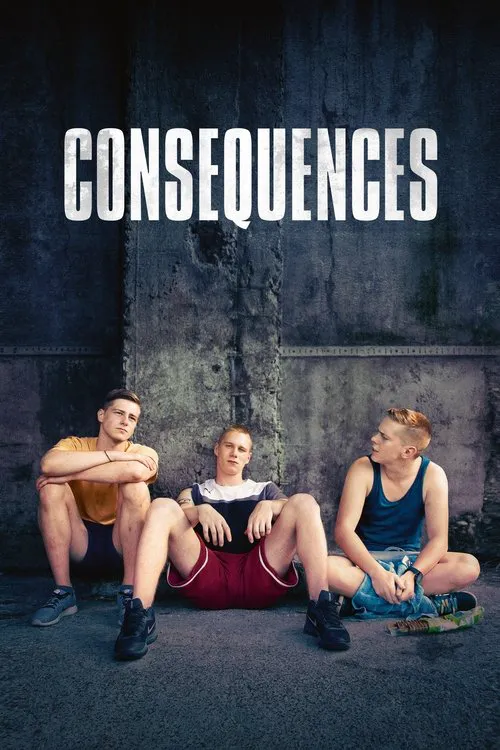Consequences

Plot
In the harsh world of a youth detention centre, 18-year-old Andrej finds himself amidst a complex web of power dynamics, where survival often depends on one's willingness to conform and navigate the treacherous social hierarchy. As Andrej begins to settle into his new surroundings, he is drawn to Željko, a charismatic and enigmatic young man who has emerged as the informal leader of the group. Željko's presence is both captivating and intimidating, and Andrej finds himself inexorably drawn to his charismatic figure, as if helplessly swept up in a whirlpool of emotions. At first, Andrej is forced to navigate the group's social hierarchy, which is defined by power struggles, petty squabbles, and a general atmosphere of unease. Željko's dominance is marked by his calm and collected demeanor, which commands respect from the other inmates. But beneath his confident exterior, Željko is a complex and multifaceted individual, whose own secrets and demons are slowly revealed as the story unfolds. As Andrej gets closer to Željko, he is drawn into a world of intrigue and deception, where alliances are forged and broken with reckless abandon. Željko takes Andrej under his wing, introducing him to the group's inner circle and teaching him the ins and outs of navigating the detention centre's labyrinthine rules and regulations. But as Andrej becomes more integrated into the group, he begins to struggle with his repressed secret, which threatens to upend the fragile balance of power that has been established. Throughout the story, the detention centre serves as a microcosm of the outside world, where societal norms and expectations are perpetuated and reinforced. The group's dynamics are shaped by the harsh realities of their confinement, where time is measured in months and freedom is a distant memory. Yet, despite the bleak surroundings, there is a sense of camaraderie and solidarity that develops among the inmates, as they band together to survive the rigors of detention. As Andrej's relationship with Željko deepens, he is confronted with a fundamental question: to what lengths will he go to maintain his secret, and at what cost to his relationships with the other inmates? Željko, sensing Andrej's vulnerabilities, begins to push the boundaries of their friendship, testing his loyalty and trustworthiness. Meanwhile, tensions rise as the authorities crack down on the group, imposing harsh sanctions and restrictions on their already limited freedoms. One of the most striking aspects of the film is its nuanced portrayal of masculinity, which is often associated with aggression, dominance, and power. Željko's character challenges these stereotypes, revealing a vulnerable and sensitive individual who is haunted by his own past traumas. As Andrej gets closer to Željko, he finds himself drawn to his vulnerability, which serves as a counterpoint to the more aggressive posturing of the other inmates. The cinematography in the film is stark and unflinching, capturing the bleak and unforgiving landscape of the detention centre. The use of muted colours and high-contrast lighting creates a sense of unease and tension, underscoring the sense of desperation that pervades the group's experience. The score is equally effective, adding a layer of emotional depth and complexity to the narrative. Throughout the story, the director maintains a delicate balance between depicting the harsh realities of detention centre life and exploring the complex emotional dynamics of the characters. The film's portrayal of masculinity and vulnerability is particularly noteworthy, offering a nuanced and thought-provoking commentary on the ways in which societal norms and expectations can both enable and constrain us. As the story reaches its climax, Andrej is forced to make a choice between maintaining his secret and risking everything for a fragile glimmer of hope. The outcome is far from certain, and yet, it is here that the film's greatest strength lies: its ability to evoke a deep sense of empathy and understanding for the characters, even as they are drawn into the darkest corners of the human experience. The film's conclusion is both haunting and hopeful, leaving the viewer with a lasting sense of unease and a renewed appreciation for the complexities of the human condition.
Reviews
Recommendations




